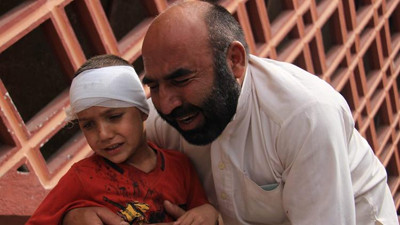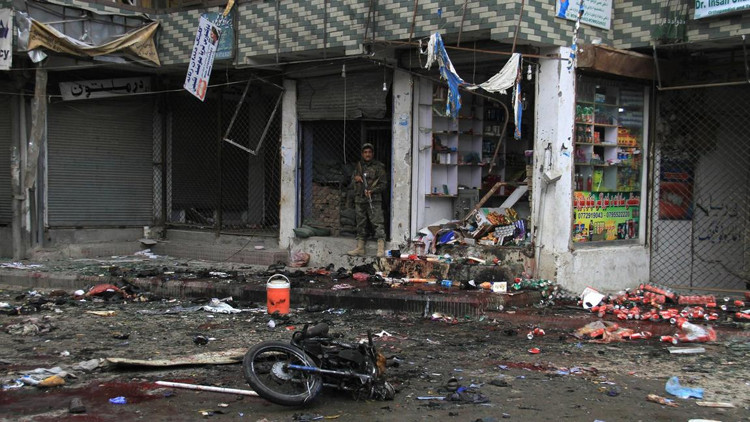Los Angeles Times, May 13, 2015
Afghans increasingly frustrated with Ashraf Ghani over security, economy
"I can't find the money to pay for bread, but they want to increase my taxes"
By Ali M. Latifi
Taking office in September, President Ashraf Ghani pledged to fight corruption and end more than a decade of war with the Taliban and its allies.
Instead, Ghani's unity government has faced a series of stiff military and economic challenges that have led to increasing disenchantment after the first peaceful transfer of power in Afghanistan's modern history.
The latest wake-up call was the bloody triple bombing on April 18 in the eastern city of Jalalabad at a branch of the New Kabul Bank, near one of the city's most crowded squares.
Officials said 34 people were killed and more than 120 injured, but residents say the casualty toll was higher.

A boys is held by his father outside a hospital where he was treated after a suicide bomb attack April 18, 2015, in Jalalabad, Afghanistan. (Photo: Ghulamullah Habibi/European Pressphoto Agency)
"To report that dozens more were killed and injured would make the security forces look weak and incapable and the opposition strong and capable," said Abdul-Rahim Saraf, 40, a nongovernmental organization employee who buried four of his friends and neighbors after the attack. "In 14 years, we've never witnessed anything like this."
Authorities have blamed militants allied with Islamic State, the Sunni Muslim extremist group that last year seized large portions of Syria and northern and western Iraq.
Another April attack, by Taliban forces, left 28 members of the Afghan National Army dead in the northeastern province of Badakhshan.
The uptick in violence has occurred as Ghani, in office for seven months, has not been able to win approval of a defense minister.
Frustration also is mounting over economic concerns.
In February, the governor of Nangarhar province said embezzlement and fraud were behind a loss of $2.5 million monthly in potential revenue.
In Kabul, residents are equally weary of deteriorating security and a stagnant economy.
On April 6, hundreds of shop owners and bread sellers across the capital closed their doors to protest what they termed an "unprecedented" tax increase.
Farid, 54, who goes by one name, temporarily shut down his tailor shop to express his frustration.
"I can't find the money to pay for bread, but they want to increase my taxes," said Farid, who incurs about $17.50 a day in expenses for his shop.
A tax increase, which for some exceeds 300%, has led Farid to call the Kabul administration a government of thieves.
Though Farid said he had little hope for the government from the start, several other Kabul business owners say they have seen their early beliefs turn into feelings of dejection.

The site of a suicide bombing attack April 18 in a busy area near a bank in Jalalabad. (Photo: Associated Press)
Ahmad, who owns a furniture shop on Chicken Street, an area known for handicrafts and textiles that is frequented by rich Afghans and foreigners, said business has been affected by security and economic concerns.
"I ended last year in debt. Already this year looks to be worse than even that," said Ahmad, 35, who also goes by one name. "All of the foreigners who used to be here either left or now live in compounds, so they have little use for furniture."
Most of the handicrafts and furniture Ahmad sells come from the eastern province of Nuristan, long known for its woodwork and crafts. But the increase in violence in the province led to delays in filling orders.
"So many times, our workers would be in the markets looking for materials or working in their studios when they would find themselves near a bombing, a shooting or some other danger," Ahmad said.
The danger level finally reached the point, he said, that he moved an entire Nuristani family working for him to Jalalabad.
The tax increase, which caused his annual bill to increase to $870 from $173, was an insult, Ahmad said. "We were all hopeful that a new presidency would mean a new beginning, but now we're trapped. We can't go outside due to fear for our safety and we can't buy anything because there is no work."
Ahmad brushes off claims that the composition of the unity government, under which Ghani agreed in a U.S.-brokered deal to make his election rival Abdullah Abdullah chief executive, is to blame for its shortcomings.
"All it takes is one man," he said. "In a classroom, a professor teaches 30 students at a time. Why can't the president do the same?"
Farid, the tailor, said the government has only further empowered the same corrupt officials as in the past.
"It's always the same 50 or 60 people in different positions. They act like they are the only knowledgeable, capable people in the country."
Latifi is a special correspondent.
Originally published on Apr. 30, 2015
Characters Count: 6168
